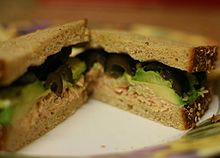Tuna sandwich

A tuna fish sandwich with black olives and avocado
|
|
| Alternative names | Tuna salad sandwich, tuna sandwich |
|---|---|
| Type | Sandwich |
| Place of origin | Various |
| Main ingredients | Tuna salad, mayonnaise, celery |
| Variations | Tuna boat, tuna melt |
| |
|
A tuna fish sandwich, also known as a tuna salad sandwich or a tuna sandwich, is a sandwich made from canned tuna, usually combined with mayonnaise and other ingredients such as celery or onion. Common variations include the tuna boat (served on a bun or roll) and tuna melt (served with melted cheese).
In the United States, 52% of canned tuna is used for sandwiches. The tuna fish sandwich has been called "the mainstay of almost everyone's American childhood," and "the staple of the snatched office lunch for a generation."
A tuna fish sandwich is usually made with canned tuna mixed with mayonnaise and other ingredients, such as chopped celery, pickles or pickle relish, hard-boiled eggs, onion, cucumber, sweetcorn, and/or black olives. Other recipes may use olive oil, Miracle Whip, salad cream, mustard, or yogurt instead of or in addition to mayonnaise. The sandwich may be topped with lettuce, tomato or other vegetables and fruits, such as cucumbers, bean sprouts or avocado in any combination.
Tuna is a relatively high protein food and it is very high in omega-3 fatty acids. A sandwich made from 100 grams of tuna and two slices of toasted white bread has approximately 287 Calories, 96 Calories of which are from fat (10.5 grams fat). It also has 20 grams of protein and 27 grams of carbohydrates.
According to the StarKist company:
The nutritional content of albacore may vary naturally from catch to catch. In particular, the fat and calorie content will differ depending on the region or depth where the fish are caught. Albacore tuna that swim close to the water surface can be higher in fat than tuna caught in deep ocean waters—but they are also lower in mercury content and higher in omega-3 content. Because availability of albacore tuna may vary from season to season, we use two different labels to accurately show the fat and calorie content of the product contents.
...
Wikipedia
